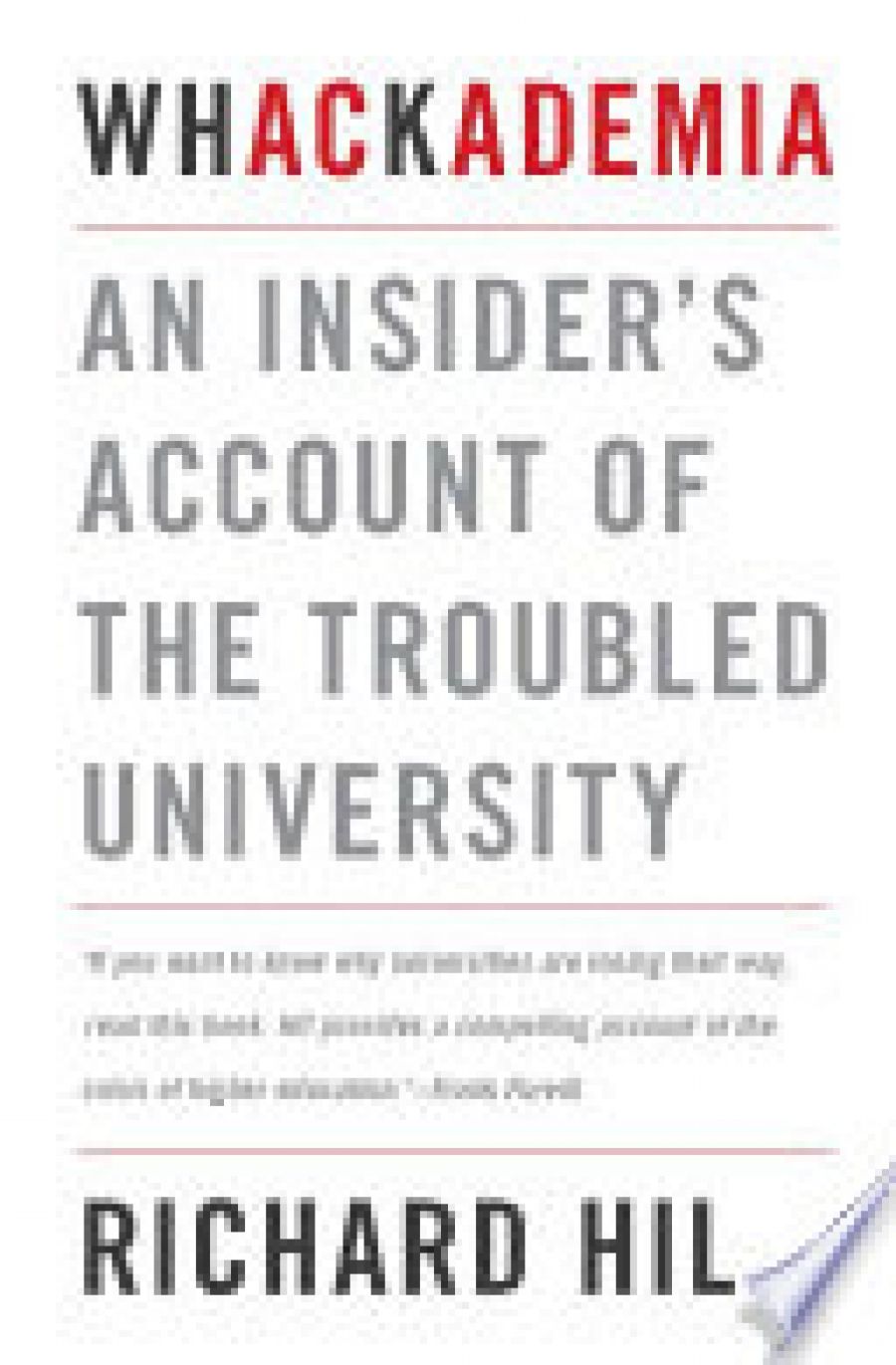
- Free Article: No
- Contents Category: Education
- Review Article: Yes
- Online Only: No
- Custom Highlight Text:
J.M. Coetzee’s novel Disgrace (1999) dramatises a cynical middle-aged professor of literature reduced to teaching communication skills at a university whose great rationalisation has turned scholars into mere clerks. Richard Hil, in his Whackademia: An Insider’s Account of the Troubled University, does what Coetzee’s jaded character could never do: write a socially responsible book about the robotic processes of over-administration that academics have come to endure. Hil describes a ‘turgid rationalist’ and ‘capitalist market’ system that has transformed universities from being centres of teaching and research into nightmare factories of marketing and bureaucracy.
- Book 1 Title: Whackademia
- Book 1 Subtitle: An Insider’s Account of the Troubled University
- Book 1 Biblio: NewSouth Publishing, $34.99 pb, 239 pp
Disturbingly, Whackademia also reveals that casual employees now account for approximately sixty per cent of Australian academic staff. A majority of tertiary educators live with the constant anxiety of job uncertainty. However, casual staff members are not the only ones suffering. Those working on a continuing basis have to cope with what Hil describes as the ‘massification’ of student intakes that overwhelms the diminished number of full-time academic staff.
Hil coins the relatively new term of the ‘student-shopper’, which takes the concept of the student consumer to an-other level, where universities operate as corporations in marketing their degrees as wares and products. As open marketplaces, universities vie for student-shoppers by spruiking their products as shinier, more innovative, more advanced than those of their competitors. The linguistic shift from consumer to shopper highlights a demoralised university that is as vulnerable to market forces as is any other corporation, except that the product –education – is not an object in itself.However, the corporate language of business, mixed with advertising buzzwords, would have us believe that critical thinking skills are exchangeable commodities.
Whackademia’s account of the heavily marketed, over-administered, and under-staffed university is not exaggerated. Media reports of academic staff cuts come across as rewards in making scholars redundant. In light of this, it is perhaps surprising that the vice-chancellor of Macquarie University, Professor Steven Schwartz, is characterised as a heroic figure in affirming a liberal arts education. The Sydney Morning Herald reported that Schwartz’s salary package for the 2011 financial year amounted to $1.1 million. Hil fails to address the fiscal inequality of a university system where the earnings of vice-chancellors dwarf those of prime ministers.
Furthermore, Hil’s assertion that universities are ‘insular places’ undercuts his argument, since this attitude is consistent with that of 1980s Labor Minister of Employment, Education, and Training John Dawkins, whose reforms turned universities into open marketplaces. Hil acknowledges the damage done by Dawkins, but his argument lapses in upholding the opposition between the university and the real world. The contention that universities are closed spheres may be contradicted by his revelation that he once worked for the Queensland University of Technology, which was one of the first universities to advertise itself as ‘a University for the Real World’. What precisely is this ‘real world’? If it involves employment, bills, a mortgage, and the grim fact of death, then it includes the majority of academics who, as casuals without job security, receive no sick leave benefits or long service entitlements and have little to no hope of securing a home loan. Hil recognises some of these difficulties, but his argument lacks rigour.
Certainly, he is aware of the human toll of being overworked and over-regulated by a system that is as imposing as it can be intimidating. Given the university’s pecking order and internal politics, the identities of many complainants are concealed. This does not mean that there is no resistance. As Hil notes, ‘complaint is rife among academics, even among apologists of the current system’, referring to the criticisms of such renowned scholars as Martha Nussbaum and Terry Eagleton. Public debate from these respected thinkers is important, yet their fame also means that their censure poses no threat to their careers. This detail is not acknowledged.
Other books on the subject – including Graeme Davison and Kate Murphy’s University Unlimited: The Monash Story (2012), Philip W. Jackson’s What Is Education? (2011), and Donald Meyers’s unpublished e-book Australian Universities: A Portrait of Decline – address similar issues. Interestingly, either Monash University or Melbourne University Publishing refused Meyers’s manuscript – or perhaps both: there is some confusion as to which university actually passed on the book – which is unfortunate since it provides a very amusing and sharp account of a demoralised university that is perhaps more critically astute than Whackademia.
The cost of untenable academic working conditions is well documented, but Hil is misguided in believing that student-shoppers are given privileged status because they provide universities with the economic means in which to function as capitalistic enterprises. Staff and course cutting, associated with overcrowded lectures and tutorials, do not provide value for money. Furthermore, the increasing dominance of online learning, as well as the pressures of balancing study and work, means that the likelihood of students forming meaningful friendships through campus interaction is decreased. These deficiencies are not given adequate attention.
In spite of these shortcomings, what redeems Hil’s book is its desire to retrieve a sense of intrinsic worth in education, which is admirable in a present political, social, and educational climate that seems to fundamentally undervalue the virtues of knowledge. Whackademia may have its problems, but it is written in the spirit of genuinely caring about tertiary education.


Comments powered by CComment